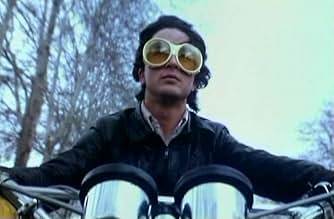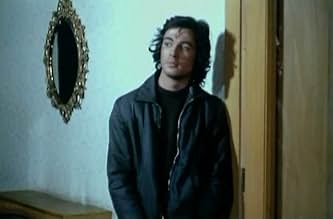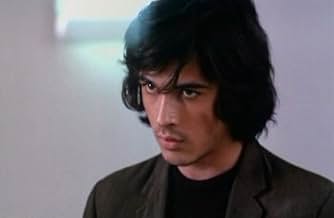Füge eine Handlung in deiner Sprache hinzuAli and his father go from their poor neighborhood in the outskirts of the city to a hospital so that Ali's father can be treated for his sickness. However since they have no money, Ali star... Alles lesenAli and his father go from their poor neighborhood in the outskirts of the city to a hospital so that Ali's father can be treated for his sickness. However since they have no money, Ali starts to work for Dr. Sameri who deals in blood.Ali and his father go from their poor neighborhood in the outskirts of the city to a hospital so that Ali's father can be treated for his sickness. However since they have no money, Ali starts to work for Dr. Sameri who deals in blood.
- Auszeichnungen
- 2 Gewinne & 1 Nominierung insgesamt
Bahman Forsi
- Doctor Davoudzadeh
- (as Bahman Fersi)
Ali Nasirian
- Esmail
- (as Ali Nassirian)
Handlung
WUSSTEST DU SCHON:
- WissenswertesThe film was co-sponsored by the Ministry of Culture but encountered opposition from the Iranian medical establishment and was banned for three years. It was finally released in 1977, with help from pressure from the Carter administration to increase human rights and intellectual freedoms in Iran.
Ausgewählte Rezension
Banned for three and a half years in it's native Iran, Dariush Mehrjui's "The Cycle" is one of the great films of the Iranian New Wave that began with Mehrjui's own film "The Cow" in 1969. "The Cycle" is a bitter cynical work, but it is not depressing. Mehrjui's strong direction, and his intelligent, insightful exploration of sensitive social issues make for a fascinating film that only grows more so upon further viewings. The film concerns a young man named Ali who, after taking his sick elderly father from the country to a Tehran hospital, becomes increasingly corrupted by the shady businesses that operate within the hospital. While his father waits endlessly for treatment, Ali rises to the top of the black market, selling everything from leftover food from the hospital kitchen to, most disturbingly, tainted blood. When Ali's father dies, he barely notices, and at his father's funeral, although he seems ashamed for what he has done, we sense that he will go back to his newfound occupation after the funeral.
Significantly, this was the first film made under the auspices of the PFU (Progressive Film-maker's Union), an organization co-founded by Mehrjui himself, that aimed to make artistically challenging films that reflected Iranian culture and society, but also had an international appeal. The film does have universal appeal in that it moves a fast pace, and has well developed characters, but it is also very specifically Iranian. I'm unqualified to say whether the selling of tainted blood was a serious problem in Iran at the time the film was made, but that's not what the film is really about. In fact Ali's corruption represents the loss of values in Iranian youth.
Mehrjui is a director capable of making films that use in-your-face experimental techniques to pull the audience into the world he has created. Witness "The Cow" or "The Postman" (1970) as examples. However, "The Cycle" proves that Mehrjui is also quite adept at using subtler means to express his themes. In this film, we seem to be in a more "realistic" world than the other two films mentioned. Gone are the reverse-negative and slow motion imagery of "The Cow", and gone are the grainy black and white, silent film effects (irises, sped up footage) of "The Postman". Yet Mehrjui controls this seemingly more realistic world just as rigidly as he did in those two dream-like films. Notice the impossibly deserted hospital that seems more like a haunted mansion with its long dark hallways and cavernous bowels.
Darkness is used as an important metaphor as well, but not in a clichéd, predictable "day = good, night = bad" way. Throughout the film we are mostly in either dark interiors or night exteriors, emphasizing the dark side of humanity that we are witnessing. At the very end we are in daylight, but by the time Ali gets to his father's funeral, it is dusk. A lesser director might start the film at dawn, have the main story during the day, and then end at night. For Mehrjui, the night reflects the world the characters live in, but the dusk shows Ali's doubt. He's finally able to see beyond the darkness. Unfortunately the sun is setting, and he will soon be back in what has now become his reality: darkness.
However the film is not a simple condemnation of young people, since the father is also shown as a cruel and impatient man. In this respect, Ali seems to have nowhere to go, and this is the problem Mehrjui was concerned with. However the Iranian Medical Association simply saw a film about a corrupt hospital, and was powerful enough to hold up the film's release for over three years upon its completion in 1974. I'm assuming the film would be banned once again for different reasons today. The sexual situations depicted in the film would not go over well with the Islamic regime. Nor would the rampant profanity, which was unusual even then in an Iranian film, and of course, after 1979, would be non-existent in an Iranian film today.
It's sad that today most young people living in Iran might not be able to see "The Cycle". It is one of the rare films that accurately reflects the loss of innocence in the modern world without being preachy or pointlessly cynical. Although the film is indeed cynical, it clearly and intelligently makes its point, and therefore the feeling one gets after watching the film is one of fulfillment, because Mehrjui has stated his case so well.
Significantly, this was the first film made under the auspices of the PFU (Progressive Film-maker's Union), an organization co-founded by Mehrjui himself, that aimed to make artistically challenging films that reflected Iranian culture and society, but also had an international appeal. The film does have universal appeal in that it moves a fast pace, and has well developed characters, but it is also very specifically Iranian. I'm unqualified to say whether the selling of tainted blood was a serious problem in Iran at the time the film was made, but that's not what the film is really about. In fact Ali's corruption represents the loss of values in Iranian youth.
Mehrjui is a director capable of making films that use in-your-face experimental techniques to pull the audience into the world he has created. Witness "The Cow" or "The Postman" (1970) as examples. However, "The Cycle" proves that Mehrjui is also quite adept at using subtler means to express his themes. In this film, we seem to be in a more "realistic" world than the other two films mentioned. Gone are the reverse-negative and slow motion imagery of "The Cow", and gone are the grainy black and white, silent film effects (irises, sped up footage) of "The Postman". Yet Mehrjui controls this seemingly more realistic world just as rigidly as he did in those two dream-like films. Notice the impossibly deserted hospital that seems more like a haunted mansion with its long dark hallways and cavernous bowels.
Darkness is used as an important metaphor as well, but not in a clichéd, predictable "day = good, night = bad" way. Throughout the film we are mostly in either dark interiors or night exteriors, emphasizing the dark side of humanity that we are witnessing. At the very end we are in daylight, but by the time Ali gets to his father's funeral, it is dusk. A lesser director might start the film at dawn, have the main story during the day, and then end at night. For Mehrjui, the night reflects the world the characters live in, but the dusk shows Ali's doubt. He's finally able to see beyond the darkness. Unfortunately the sun is setting, and he will soon be back in what has now become his reality: darkness.
However the film is not a simple condemnation of young people, since the father is also shown as a cruel and impatient man. In this respect, Ali seems to have nowhere to go, and this is the problem Mehrjui was concerned with. However the Iranian Medical Association simply saw a film about a corrupt hospital, and was powerful enough to hold up the film's release for over three years upon its completion in 1974. I'm assuming the film would be banned once again for different reasons today. The sexual situations depicted in the film would not go over well with the Islamic regime. Nor would the rampant profanity, which was unusual even then in an Iranian film, and of course, after 1979, would be non-existent in an Iranian film today.
It's sad that today most young people living in Iran might not be able to see "The Cycle". It is one of the rare films that accurately reflects the loss of innocence in the modern world without being preachy or pointlessly cynical. Although the film is indeed cynical, it clearly and intelligently makes its point, and therefore the feeling one gets after watching the film is one of fulfillment, because Mehrjui has stated his case so well.
Top-Auswahl
Melde dich zum Bewerten an und greife auf die Watchlist für personalisierte Empfehlungen zu.
Details
- Erscheinungsdatum
- Herkunftsland
- Offizielle Standorte
- Sprache
- Auch bekannt als
- The Cycle
- Drehorte
- Mashhad, Iran(Hospital location)
- Produktionsfirmen
- Weitere beteiligte Unternehmen bei IMDbPro anzeigen
- Laufzeit1 Stunde 41 Minuten
- Sound-Mix
- Seitenverhältnis
- 1.37 : 1
Zu dieser Seite beitragen
Bearbeitung vorschlagen oder fehlenden Inhalt hinzufügen






























